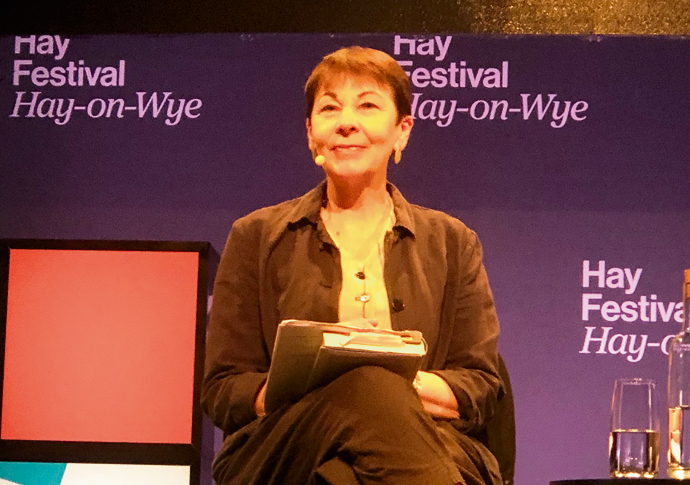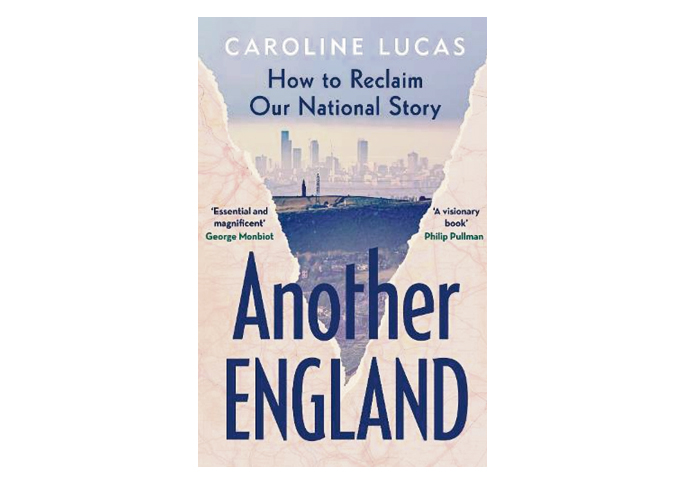‘England is suffering from an identity crisis at the moment’
In a sell-out talk at the Hay Festival, Caroline Lucas explained why the left needs to get a lot better at telling stories
Thursday, 6th June 2024 — By Dan Carrier

Caroline Lucas urges a rediscovery of stories to explore national values
SHARING tales of the people who have helped create our nation is crucial to building a better Britain, former Green Party MP Caroline Lucas told a sell-out crowd at the Hay Festival.
Lucas, who is not standing in the general election, was talking about her new book, Another England: How To Reclaim Our National Story.
She said for too long national conversations and sense of shared identity was based on a narrative formed by the right.
“Many of our folk stories have a strong sense of social justice,” she said. “But do we still have these values?
“This government has rowed back on so many things we think are suitable for the Mother of Parliaments – the independence of the press, the judiciary, trade unions. This government kept coming up with draconian policies. We risk losing our proud heritage of peaceful protests, for example. To stop this, we need to always remind people of their stories and their political heritage. We must use them to counter a government which on a near daily basis has taken away our rights.”
Lucas was first elected as the member for Brighton Pavilion in 2010 with a 2,250 majority. She went on to win successive elections up to 2019, when she secured a majority of more than 20,000.
As well as her work in the green movement, she has a PhD in English literature. Her book uses literary references to build up an argument about finding a different way to look at England as a collective entity.
“Thinking about national identity and literature was an obvious starting point for me,” she said. “Stories are so important. They have consequences. It is how you perceive your community, how you make sense of the world around you.”

And this is where progressives fail, she said.
“The left need to get a lot better at telling stories. It is the preserve of the right. We seem to be a bit squeamish about stories. We seem to only want to stick to the facts. But sticking to the facts did not win the Brexit referendum.
“On the left we said ‘vote for Brexit and the food in your shopping trolley will cost more’. It was true, but it did not have the same cachet as an argument that simply said ‘take back control’.”It is not a problem unique to the UK. “This is playing out in the USA at the moment,” she added. “Biden should have the better story. He is doing all the right things and his Inflation Reduction Act is working. But his story is essentially defensive. The Trump story is dark and vicious and horrible but it is having a much better effect.”
A crucial point behind rediscovering stories that paint a different picture of our national values is reinstalling a sense of can-do pride.
“England is suffering from an identity crisis at the moment,” she said. “Every region bar London voted leave and in the main it had absolutely nothing to do with the EU.
“People have a strong sense of pride in place but a real sense of a lack of agency and power. Decisions are made away from them. They feel they have no relevance.”
Her answer is further devolution, including a possible English parliament – and remembering deeply ingrained progressive stories that shaped the nation as much as those of military conquests and disasters, of kings and queens and industrial might.
“Encouraging a new discussion of England’s past means countering some of the dishonesty peddled. For example, right-wing rhetoric will focus on the Battle of Britain to claim we are stronger on our own,” she said.
“But that ignores the fact many RAF pilots were European refugees. As long as we allow the right to be in charge of story-telling, this is what you get: nostalgia for a Boris Johnson England that somehow is always world-beating. Telling a different story is a wholly political act. We are a more progressive and inclusive nation than we are led to believe.”
She said our national conversation was all too often shut down if it did not go along well-worn tropes, but alternatives are under our noses. “Think of Shakespeare and The Tempest,” she said. “It raised questions about how ethical it was to rock up to an island, stick a flag in the middle and claim it as your own.”
She compares the work of Charles Dickens and Elizabeth Gaskell. “Gaskell made a strong political point,” she says. “With Dickens in Oliver Twist, he showed the poverty and squalor and focused attention – but look at what happens at the end. Oliver discovers he is of noble birth and is put back in his class. There is nothing much challenging the system as a whole there.
“Elizabeth Gaskell wrote Mary Barton, a working-class woman. In her book, trade unions are organising against injustices. She offered an understanding of work and social justice.”
Remembering the heroes who fought to make a UK a respected democracy means regaining the curriculum, too.
“The Tories do not want us to have a wider educational offer, they don’t want people to grow up ashamed of colonialism,” she said.
One story that could be told, she said, is that of the Diggers of 1649 – the landless involved in peaceful direct action, part of a long tradition of fighting for land reform. “Another favourite is the Charter of the Forest. Magna Carta was signed in 1215, the Charter 1217, but no one teaches the Charter. It enshrined the right to use common land, to collect firewood, graze animals, for example, and was only rescinded in 1971.”
Rekindling pride in a fairer Britain might help us counter the issues we face today, she added. “We are still the sixth-richest country in the world but we have people having to choose between feeding children or turning on the heating.
“It is obscene and comes down to political choices.”
• Another England: How To Reclaim Our National Story. By Caroline Lucas. Hutchinson Heinemann, £22